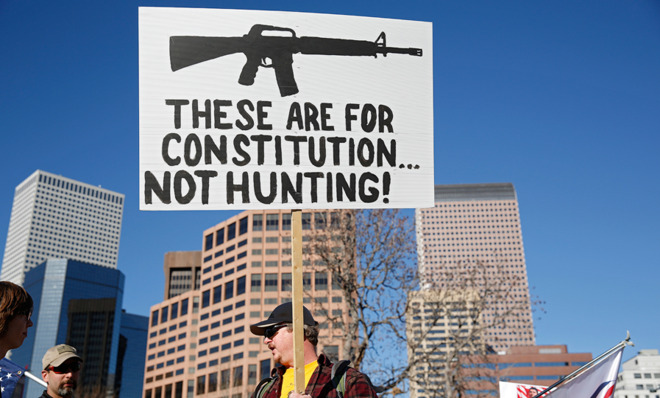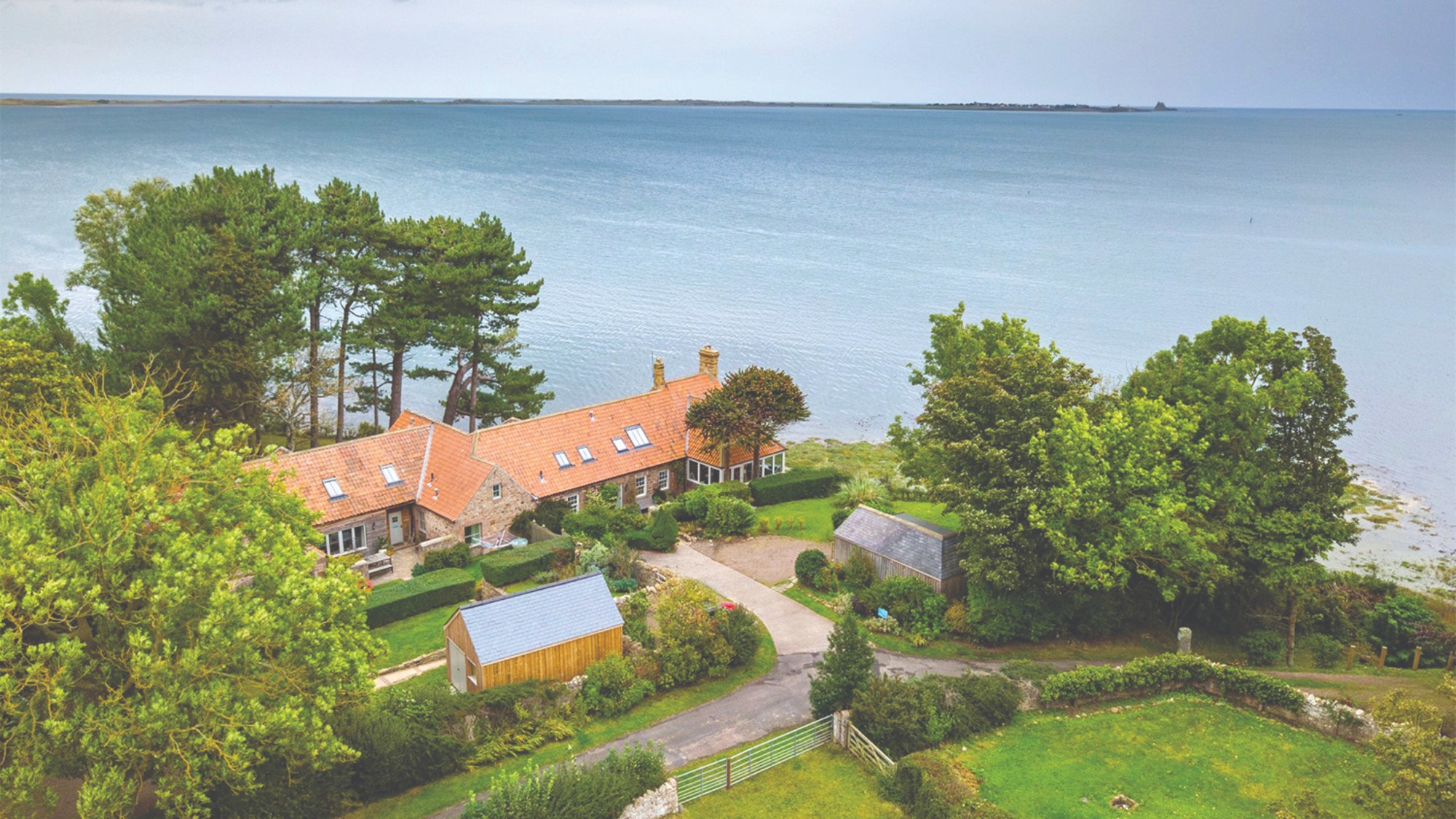Ban the Second Amendment
Imagine the Second Amendment didn't exist, and try arguing for a constitutional right to gun ownership. You will fail.

A free daily email with the biggest news stories of the day – and the best features from TheWeek.com
You are now subscribed
Your newsletter sign-up was successful
Sleepy Hollow, an absurdly entertaining new show recasting Ichabod Crane as a time-traveling Revolutionary War hero who fights evil with George Washington's Bible, took some time near the end of its first season to address gun rights.
"Crane, remind me to later have a chat about what your founding friends were thinking when they crafted our rights to bear arms," police lieutenant Abbie Mills tells the aforementioned Ichabod.
"There was concern among us that it could lead to perverse consequences," he concedes.
The Week
Escape your echo chamber. Get the facts behind the news, plus analysis from multiple perspectives.

Sign up for The Week's Free Newsletters
From our morning news briefing to a weekly Good News Newsletter, get the best of The Week delivered directly to your inbox.
From our morning news briefing to a weekly Good News Newsletter, get the best of The Week delivered directly to your inbox.
Did it ever. About 32,000 Americans are killed each year using guns (murder or suicide), and a mountain evidence makes it increasingly clear that the wide availability of firearms in the United States bears a great deal of blame.
There is no longer any defensible argument for a constitutional right to own a firearm, if there ever was.
Let's bracket the notoriously confusing text of the Second Amendment, and pretend we were writing the thing from scratch. Why would you want a gun rights proviso? I can think of three reasons, broadly speaking.
1. Guns protect liberty. Citizens have the right to rebel against a tyrannical government, and they need guns to do that.
A free daily email with the biggest news stories of the day – and the best features from TheWeek.com
2. Citizens have a right to defend themselves however they'd like. Gun rights enable self-defense and, thus, save lives.
3. People enjoy guns, and millions of reasonable gun owners shouldn't be deprived of something they love because other people abuse it.
Each of these arguments depends on indefensible factual and/or moral assumptions. I'll take them in turn.
The "right to rebel" argument assumes that armed revolt is the last option available if the American government ever goes Full Weimar. Not only has that never happened in a consolidated democracy like the United States, but that kind of paranoid thinking is itself profoundly corrosive of democratic politics.
What's more, it's wrong. Political scientists Erica Chenoweth and Maria Stephan's book Why Civil Resistance Works puts together compelling statistical evidence that non-violent protest is more likely to attract mass participation and topple governments than its armed twin, especially in the modern era. Protecting gun ownership, it turns out, is a terrible way to facilitate rebellions against the state. That goes double when the weapons protected are handguns rather than automatic rifles, RPGs, and anti-aircraft batteries.
The second argument in favor of untrammeled gun ownership, a right to self-defense, is equally incoherent. For starters, there's no reason that, in a civil society, the right to defend yourself implies the right to defend yourself however you'd like. A basic part of government's job is to limit our ability to hurt others; assuming the absolute right to self-defense constitutes, in Alan Jacobs' evocative phrasing, "the absolute abandonment of civil society."
And indeed, the evidence is very clear that a government that fails to adequately regulate guns is failing in its duty to protect its citizens. A recent study found that, after Missouri repealed its background check law, the murder rate spiked by 16 percent; the researchers tracked many of the killings back to newly purchased guns. Conservative writer Robert VerBruggen double-checked the data, and concluded that "the state's murder rate indeed soared the year after a gun law changed, and there's no other obvious explanation."
It's not just that background checks save lives, however: Guns take them. Contrary to what you may have heard, there just isn't that much scientific controversy about whether easy access to guns helps more than it hurts. Two recent, methodologically rigorous studies confirmed that high levels of gun ownership lead to both more murders and more suicides. A recent survey of the best research on guns confirmed that those two studies spoke for the consensus of gun researchers.
So there's one argument left: the idea that because people deeply enjoy firearms and gun culture, it's wrong for the federal government to restrict it. This is easily the most serious of the three arguments. There's more than a whiff of disdain for "rifle-toting rubes" in the anti-gun argument, and it's terribly immoral to use the power of the government to restrict people's rights merely because you find their subculture unpleasant.
Still, this isn't nearly good enough to defend a constitutional right to gun ownership. The rights you protect in a constitution — rights to free speech and against arbitrary discrimination, for instance — are fundamental rights, to be protected absolutely. They deserve that status because they are so essential to the functioning of a democracy that no majority should be permitted to override them.
Gun rights don't rise to that status. The basic principle of a liberal democracy is that, for laws to be legitimate, majorities must enact them. Setting aside the basic rights protections necessary for majority rule to function fairly, any other determinations about the scope of lesser rights should be set by Congress and state legislatures. Gun rights, then, shouldn't be constitutionally protected.
Instead, they should be regulated like another dangerous thing many Americans enjoy: drugs. People who deeply enjoy alcohol, marijuana, and other drugs should be free to use them — drug prohibition is monstrously illiberal. But that doesn't mean that they should be able to get wasted while driving, on the job, or when underage.
Likewise, the fact that there's a liberty interest in allowing gun ownership doesn't mean guns should be easy to get. Background checks are a no-brainer, but beyond that, it should be much harder to purchase guns and the penalties for abusing them should be much more serious. For instance, Japan's onerous gun regulations have almost wiped out gun crime. Many of these rules, like requiring that gun owners regularly undertake the equivalent of a driver's test for guns, can be borrowed without imposing a full handgun ban.
"Having a gun now is like having a time bomb," one Yakuza (Japanese mafia) boss told The Japan Times' Jake Adelstein. "Do you think any sane person wants to keep one around the house?"
Our Yakuza don is, much like Ichabod Crane, an unexpected source of wisdom. While it's probably impossible to eliminate the Second Amendment today, and not worth the resources it would take to find out, one thing is clear: The Founding Fathers of the Sleepy Hollow universe were right to worry. There are thousands of "perverse consequences" every year that vindicate their hesitation.
Zack Beauchamp is a Reporter/Blogger for ThinkProgress. He previously contributed to Andrew Sullivan's The Dish at Newsweek/Daily Beast, and has also written for Foreign Policy and Tablet magazines. Zack holds B.A.s in Philosophy and Political Science from Brown University and an M.Sc in International Relations from the London School of Economics.
-
 What to watch out for at the Winter Olympics
What to watch out for at the Winter OlympicsThe Explainer Family dynasties, Ice agents and unlikely heroes are expected at the tournament
-
 Properties of the week: houses near spectacular coastal walks
Properties of the week: houses near spectacular coastal walksThe Week Recommends Featuring homes in Cornwall, Devon and Northumberland
-
 Will Beatrice and Eugenie be dragged into the Epstein scandal?
Will Beatrice and Eugenie be dragged into the Epstein scandal?Talking Point The latest slew of embarrassing emails from Fergie to the notorious sex offender have put her daughters in a deeply uncomfortable position
-
 The billionaires’ wealth tax: a catastrophe for California?
The billionaires’ wealth tax: a catastrophe for California?Talking Point Peter Thiel and Larry Page preparing to change state residency
-
 Bari Weiss’ ‘60 Minutes’ scandal is about more than one report
Bari Weiss’ ‘60 Minutes’ scandal is about more than one reportIN THE SPOTLIGHT By blocking an approved segment on a controversial prison holding US deportees in El Salvador, the editor-in-chief of CBS News has become the main story
-
 Has Zohran Mamdani shown the Democrats how to win again?
Has Zohran Mamdani shown the Democrats how to win again?Today’s Big Question New York City mayoral election touted as victory for left-wing populists but moderate centrist wins elsewhere present more complex path for Democratic Party
-
 Millions turn out for anti-Trump ‘No Kings’ rallies
Millions turn out for anti-Trump ‘No Kings’ ralliesSpeed Read An estimated 7 million people participated, 2 million more than at the first ‘No Kings’ protest in June
-
 Ghislaine Maxwell: angling for a Trump pardon
Ghislaine Maxwell: angling for a Trump pardonTalking Point Convicted sex trafficker's testimony could shed new light on president's links to Jeffrey Epstein
-
 The last words and final moments of 40 presidents
The last words and final moments of 40 presidentsThe Explainer Some are eloquent quotes worthy of the holders of the highest office in the nation, and others... aren't
-
 The JFK files: the truth at last?
The JFK files: the truth at last?In The Spotlight More than 64,000 previously classified documents relating the 1963 assassination of John F. Kennedy have been released by the Trump administration
-
 'Seriously, not literally': how should the world take Donald Trump?
'Seriously, not literally': how should the world take Donald Trump?Today's big question White House rhetoric and reality look likely to become increasingly blurred